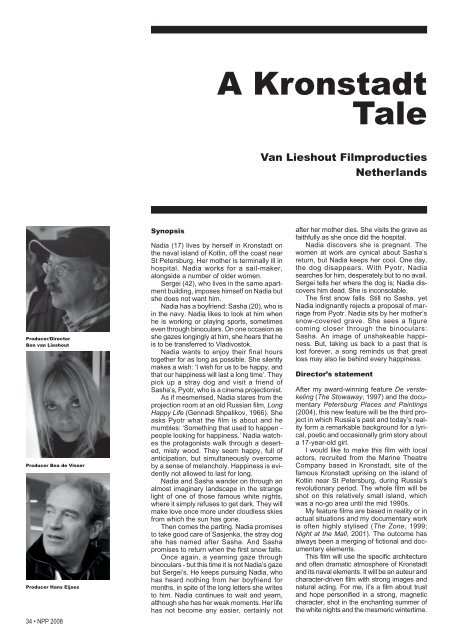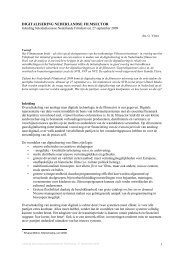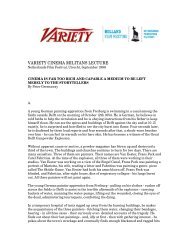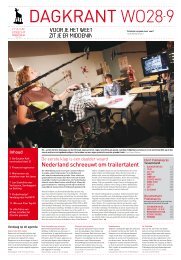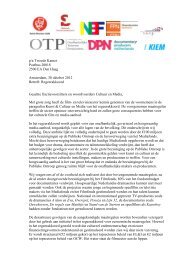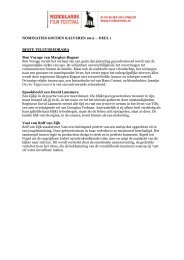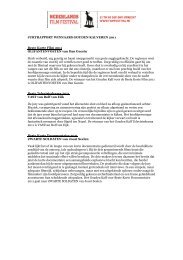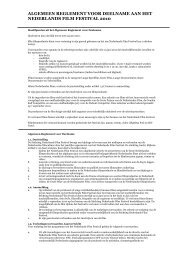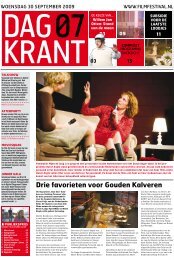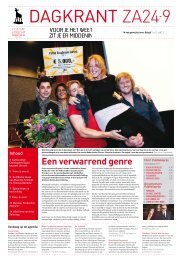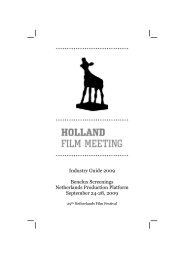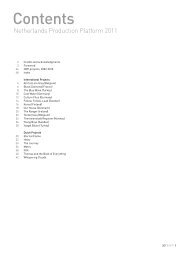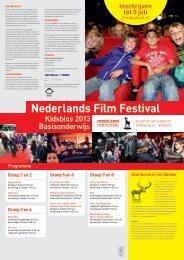Netherlands Production Platform - Nederlands Film Festival
Netherlands Production Platform - Nederlands Film Festival
Netherlands Production Platform - Nederlands Film Festival
Create successful ePaper yourself
Turn your PDF publications into a flip-book with our unique Google optimized e-Paper software.
A Kronstadt<br />
Tale<br />
Van Lieshout <strong>Film</strong>producties<br />
<strong>Netherlands</strong><br />
Producer/Director<br />
Ben van Lieshout<br />
Producer Bea de Visser<br />
Producer Hans Eijses<br />
34 • NPP 2008<br />
Synopsis<br />
Nadia (17) lives by herself in Kronstadt on<br />
the naval island of Kotlin, off the coast near<br />
St Petersburg. Her mother is terminally ill in<br />
hospital. Nadia works for a sail-maker,<br />
alongside a number of older women.<br />
Sergei (42), who lives in the same apartment<br />
building, imposes himself on Nadia but<br />
she does not want him.<br />
Nadia has a boyfriend: Sasha (20), who is<br />
in the navy. Nadia likes to look at him when<br />
he is working or playing sports, sometimes<br />
even through binoculars. On one occasion as<br />
she gazes longingly at him, she hears that he<br />
is to be transferred to Vladivostok.<br />
Nadia wants to enjoy their final hours<br />
together for as long as possible. She silently<br />
makes a wish: ‘I wish for us to be happy, and<br />
that our happiness will last a long time’. They<br />
pick up a stray dog and visit a friend of<br />
Sasha’s, Pyotr, who is a cinema projectionist.<br />
As if mesmerised, Nadia stares from the<br />
projection room at an old Russian film, Long<br />
Happy Life (Gennadi Shpalikov, 1966). She<br />
asks Pyotr what the film is about and he<br />
mumbles: ‘Something that used to happen -<br />
people looking for happiness.’ Nadia watches<br />
the protagonists walk through a deserted,<br />
misty wood. They seem happy, full of<br />
anticipation, but simultaneously overcome<br />
by a sense of melancholy. Happiness is evidently<br />
not allowed to last for long.<br />
Nadia and Sasha wander on through an<br />
almost imaginary landscape in the strange<br />
light of one of those famous white nights,<br />
where it simply refuses to get dark. They will<br />
make love once more under cloudless skies<br />
from which the sun has gone.<br />
Then comes the parting. Nadia promises<br />
to take good care of Sasjenka, the stray dog<br />
she has named after Sasha. And Sasha<br />
promises to return when the first snow falls.<br />
Once again, a yearning gaze through<br />
binoculars - but this time it is not Nadia’s gaze<br />
but Sergei’s. He keeps pursuing Nadia, who<br />
has heard nothing from her boyfriend for<br />
months, in spite of the long letters she writes<br />
to him. Nadia continues to wait and yearn,<br />
although she has her weak moments. Her life<br />
has not become any easier, certainly not<br />
after her mother dies. She visits the grave as<br />
faithfully as she once did the hospital.<br />
Nadia discovers she is pregnant. The<br />
women at work are cynical about Sasha’s<br />
return, but Nadia keeps her cool. One day,<br />
the dog disappears. With Pyotr, Nadia<br />
searches for him, desperately but to no avail.<br />
Sergei tells her where the dog is; Nadia discovers<br />
him dead. She is inconsolable.<br />
The first snow falls. Still no Sasha, yet<br />
Nadia indignantly rejects a proposal of marriage<br />
from Pyotr. Nadia sits by her mother’s<br />
snow-covered grave. She sees a figure<br />
coming closer through the binoculars:<br />
Sasha. An image of unshakeable happiness.<br />
But, taking us back to a past that is<br />
lost forever, a song reminds us that great<br />
loss may also lie behind every happiness.<br />
Director’s statement<br />
After my award-winning feature De verstekeling<br />
(The Stowaway, 1997) and the documentary<br />
Petersburg Places and Paintings<br />
(2004), this new feature will be the third project<br />
in which Russia’s past and today’s reality<br />
form a remarkable background for a lyrical,<br />
poetic and occasionally grim story about<br />
a 17-year-old girl.<br />
I would like to make this film with local<br />
actors, recruited from the Marine Theatre<br />
Company based in Kronstadt, site of the<br />
famous Kronstadt uprising on the island of<br />
Kotlin near St Petersburg, during Russia’s<br />
revolutionary period. The whole film will be<br />
shot on this relatively small island, which<br />
was a no-go area until the mid 1990s.<br />
My feature films are based in reality or in<br />
actual situations and my documentary work<br />
is often highly stylised (The Zone, 1999;<br />
Night at the Mall, 2001). The outcome has<br />
always been a merging of fictional and documentary<br />
elements.<br />
This film will use the specific architecture<br />
and often dramatic atmosphere of Kronstadt<br />
and its naval elements. It will be an auteur and<br />
character-driven film with strong images and<br />
natural acting. For me, it’s a film about trust<br />
and hope personified in a strong, magnetic<br />
character, shot in the enchanting summer of<br />
the white nights and the mesmeric wintertime.


